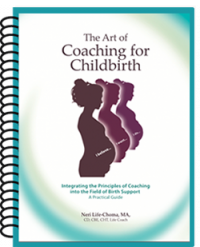
Becoming a Doula: A Good Career Choice or a Community Service?
Twenty years ago, when I was nearing the end of the yearlong doula training program in Jerusalem, my trainer advised us all not to quit our jobs in favor of establishing a doula practice. Regardless of the fact that we enrolled in a yearlong program with a commitment to give 100 hours in hospital shifts, Shoshannah guided us to view the doula role in terms of community service rather than a career path.
A doula for every woman is not just right; it’s a valuable asset
This perspective is reflected in the well-known saying “A doula for every woman”, a motto I trust was carved with noble intentions but prioritizes the welfare and empowerment of only one woman – the birthing woman, at the cost of disempowering another woman – the doula. It should be noted that the topic of doulas’ monetary compensation, just like the other two dilemmas I addressed before it, has also caused some turbulences within the doula community. This can be read in Penny Simkins’ Real Talk from Penny Simkin, in which she responded to the disagreement with this motto as expressed by a ProDoula member.
“A doula for every woman”; a motto prioritizing the empowerment of the birthing woman, at the cost of disempowering the doula.
The dispute among doulas is accurately described by my dear friend Christine Morton (Ph.D.), a researcher who conducted the most extensive study about doulas titled “Birth Ambassadors”: ”Doulas who incorporate a business rationalization into their practice are often seen in opposition to those who adopt an avowedly charitable or humanitarian role” (Birth Ambassadors, 2014, P. 199). Morton interviewed many doulas in different states and concluded that monetary compensation is less important to doulas comparing to the emotional reward they derive from having access to birth and provide support to birthing individuals. (P. 200)
However, it seems that doulas who are interested in making good income feel the need to justify their fees, as can be seen in the document I found, titled The Economics of A Doula’s Fees. It was created by a local group of doulas as a handout addressing the practicality of being a doula – the long hours and hardship, with the bottom line stating: “ We sincerely wish that all insurance plans would cover professional labor support, making it available and affordable to all women. But this is not the case. While we would like our fees to be affordable for everyone, to charge less would be doing future birthing women a disservice by making labor support an underpaid profession that cannot attract or keep talented, skilled individuals.”
Both the doula and her client are in labor; we both work hard!
Here is the thing: We all know that birthing individuals are in distress, but doulas work very hard too! The hardship is much bigger than the list of labor support tools and comfort measures we apply during childbirth. The list below is my humble attempt to portray the doula role while focusing on the labor and distress of the practicing doula, rather than the laboring women:
- Being fully present for another woman containing her fears, pains and moments of crisis with no attempt to numb, avoid, dismiss or block these.
- Being on-call 24/7 for each client from the 38th week of her pregnancy until her birth, while making daily arrangements for your family life and needs to be met and continue with as little interruptions as possible.
- Providing continuous physical and emotional support to a woman in labor and her family members for as long as birth takes, and for the additional 2 hours after the delivery when you support the bonding and the initiation of lactation.
- Mindfully and skillfully navigating in L&D, without causing tension or conflicts, facilitating your clients’ wishes, visions, values, and needs while being respectful to the approach, values, and needs of the medical system, as these are being understood and applied by the specific medical personnel attending the birth.
- Following up with one mandatory postpartum visit, while being observant and mindful not to miss or neglect signs of distress which might predict postpartum depression.
- Maintaining a successful practice includes many routine tasks, such as:
- Attending community gatherings in which you can enroll clients
- Networking with other professionals to exchange referrals
- Collaborating with backup doulas
- Scheduling and rescheduling (due to the unpredictable nature of our practice) prenatal and postpartum visits, and holding these visits.
- Emailing and texting, as well as conducting phone calls while providing resources for our clients as needed.
- Managing a website, printing marketing materials, investing in advertising campaigns, and social media presence.
- Additional costs include gas, cell phone, birth support props, and professional development.
It should be more than a labor of love. Doulas should be generously compensated for their hard work.
It should be more than a labor of love. Doulas should be generously compensated for their hard work. Our passion to support birthing individuals can motivate us to attend a doula training, but we can’t establish a doula practice based on this motivation solely. Doing it is disrespectful to ourselves and to the value of self-care. It also sacrifices our families’ needs and is a violation of the humanistic value of women’s financial stability.
I make sure that becoming a doula is a good career path!
I am committed to professionally and economically empower my students before I send them out to empower birth givers.
As a doula trainer, I make sure to address the business aspects such as fees, contracts, liability policy, business model, and more, and I teach the verbal and interpersonal skills needed to network, enroll clients, and confidently charge money. But before that, I make sure to evoke a strong professional recognition and have my doula students know their worth in monetary terms and not only emotional ones. I make sure to define and specify the unique domains in which the doula, and only her, makes a huge difference in birth givers’ processes:
- Prenatally coaching expectant individuals, enabling positive mindsets for childbirth, clarity of goals and needs, and developing accountability of clients to their positive process.
- Focusing on the quality of the whole process of pregnancy, birth and postpartum.
- Facilitating patient-centered and individualization of care by calling attention to their clients’ needs, values, expectations, and mindsets.
Once my students fully grasp the special value of their role, they can confidently charge for their service. And on top of it, they are recognized by other agents as an important member of the team. I am committed to professionally and economically empower my students before I send them out to empower birth givers.
- Overshadowing the Transformative Essence of Childbirth with Data - July 10, 2024
- Navigating the Epidural Dilemma - May 28, 2024
- Informed Decision in Birth Support: A Myth of Empowerment? - April 29, 2024


